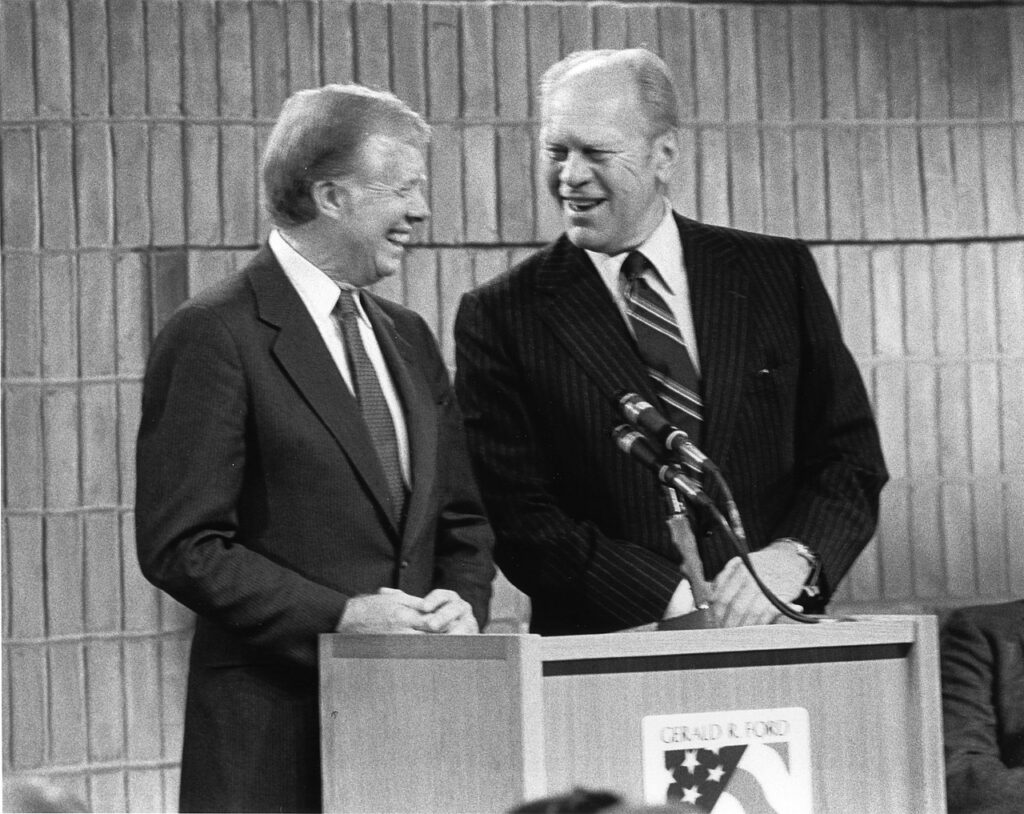Abortion, American Politics
The deadly abortion “moderation” of Jimmy Carter
Jimmy Carter, the president of the United States from 1977 to 1981, died at the age of 100 on December 29 and now lies in state in the Capital Rotunda. He is being memorialized by many public Christians (such as Russell Moore of Christianity Today) as a man of integrity and deep faith; his post-White House humanitarian work, for which he received the Nobel Peace Prize, outshone his largely lacklustre presidency. I saw him twice, although only from afar—at Barack Obama’s second inauguration in 2013, and at Donald Trump’s first inauguration in 2017, where he was sat with his wife Rosalyn alongside the Clintons and the Bushes.
Although Carter’s last public act was to vote for Kamala Harris—the most pro-abortion candidate ever to stand for America’s highest office—his own views on abortion were distinctly out of step with his increasingly extremist party. He attempted to hold an uneasy middle ground, supporting Roe v. Wade in principle while mourning it in practice. As he told Larry King of CNN in 1997:
When I was president, I announced, and I still maintain, that I can live with Roe v. Wade. I did everything I possibly could as president under that ruling, which I don’t think ought to be changed, to minimize the need for abortions. I think every abortion is a result of a horrible series of errors on the part of people involved.
And so, I made sure that our young people had adequate instruction on how to avoid pregnancy if they should choose to have sex before marriage and before they wanted a baby, abstinence is the best approach of course, I made sure that women and infant children, the WIC Program, Women and Infant Children, gave prospective mothers the assurance that they could have their child and that they would be adequately cared for economically. And I also improved the quality or ease of adoptions by a mother who didn’t want to raise her child to get matched up in a convenient way with couples who couldn’t have children of their own and could delightfully raise those children.
So, I did everything I could to minimize the need for abortions.
Indeed, during his first presidential campaign, Carter bluntly told Meet the Press: “I think abortions are wrong.” Not a single Democrat mourning him this week could politically survive such a statement today. As abortion activists increasingly hijacked the party he loved, he attempted to push back, albeit feebly and ineffectually. In 2012, he signed an open letter from Democrats for Life to President Barack Obama and the Democratic Platform Committee alongside other high-profile pro-life Democrats calling for a rejection of abortion extremism and a commitment to reducing the number of abortions.
“I have never believed that Jesus Christ would approve of abortions, and that was one of the problems I had when I was president, having to uphold Roe v. Wade, and I did everything I could to minimize the need for abortions,” Carter said at the time. Former Democrat Congressman Dan Lipinski called Carter “the last pro-life Democrat president” in First Things, noting his support for the Hyde Amendment banning federal funding for abortion and his 2018 Liberty University commencement address, in which “he condemned sex-selective abortions and lamented the ‘160 million girls and women who are not living today.’”
But as John Murdock noted in his own First Things tribute, Carter didn’t quite know what to do with his personal conviction that abortion was offensive to God and his political commitment to the Democrat Party:
In 2019, I visited one of President Carter’s Sunday school sessions in Plains, Georgia. I used my ten seconds to thank him for supporting Hyde and urged him to speak out again. He made no reply and looked a bit sheepish. A letter on the same topic went unanswered. Carter was passionate and outspoken about many worthwhile causes, from Habitat for Humanity to the eradication of disease. On abortion, though, he tried to take a moderate position on an issue that logically affords none. Carter was unwilling to take on Roe at a time when a constitutional amendment was within the realm of possibility, and he helped to herd pro-lifers out of the party. Still, he supported the Hyde Amendment in its infancy. That act of leadership helped to build a bipartisan coalition that has kept taxpayer funds from paying for abortions for decades, likely saving millions of lives. There are worse political legacies to have.
In some ways, Carter’s trajectory followed that of his predecessor, Republican Gerald Ford. Ford also attempted to stake out a middle ground and split the baby; in 1976 he declared himself opposed to abortion on demand but supportive in some instances. Decades later, in 1998, he urged the GOP to drop the abortion issue and “shift to the center.” One of his longtime Michigan constituents who knew him told me that Ford was a nice, “moderate” fellow in both demeanour and politics. Both Carter and Ford regretted the “extremism” on their respective sides; Carter, because the Democrats championed abortion, Ford, because the Republicans were—at the time—rigid on the right to life.
Sadly, after more than sixty million unborn Americans have been killed by abortion, the false “moderation” of Ford and Carter appears to be the default position not of the Democrat Party, but of the Trump GOP—and Carter utterly failed to halt his party’s descent into abortion extremism. “In the end,” Martin Luther King Jr. once wrote, “we will remember not the words of our enemies, but the silence of our friends.” The many accomplishments of Jimmy Carter are worth remembering this week. But we should never forget that in the same city that will host his funeral tomorrow, while the service unfolds, cold metal dumpsters will be yawning behind clinics and swallowing the unwanted corpses of American children.
When I hear the term “moderate” in relation to abortion, I often think of a child retrieved from an abortion clinic in Washington, D.C. in 2022. Called simply “Baby Boy # 1,” he was likely killed via a “labor and induction” abortion around 20 weeks. His head was horribly shriveled, and his puffy eyes were squeezed shut. He had a head full of hair and was perfectly formed. His mouth was fixed open. I wonder what his final moments were like. He was the victim not just of abortion extremism, but of moderation.









Anyone that says there is a « need » for elective abortion is not pro-life. Furthermore, a commitment to uphold (or bring back) Roe (even if someone privately whines about it to their aides) is very different from disagreeing with heartbeat bills but making it a state issue. If Roe is on the books, your vote doesn’t count if you’re pro-life. No matter how much pro-life candidates win by, abortion is still legal in every state. If Roe is gone, pro-life people at least have the chance to make their best case to the people of every state. It’ll be an uphill battle many times, but it’s not all or nothing and there’s evidently a way for us to win (see Nebraska and South Dakota). That is important when most Americans are not ready for anything close to a national abortion ban and getting it through congress is out of the question.
Electing Trump was not a vote to end abortion, but electing Kamala would’ve been a vote to end the pro-life movement. In the alternative timeline congress votes for the Freedom of Choice Act or whatever they call it now, President Kamala signs it in a triumphant ceremony, the Hyde Amendment is cancelled, Republicans declare abortion to be a toxic issue and aside from a few gadflies/professional virtue-signallers cease to have anything to do with it. Basically Canada but with 10 times the population and impact on the world stage. Americans voted for the pro-life movement to die another day.
agreed.